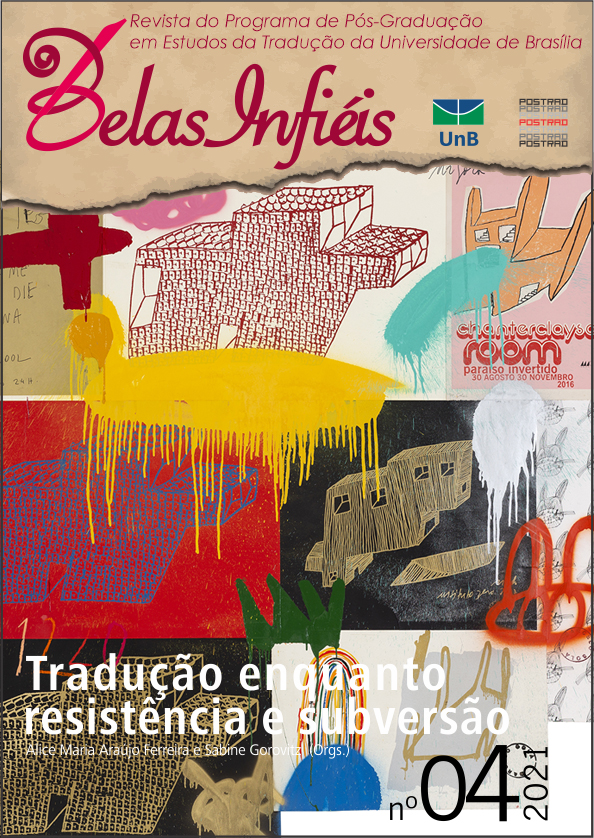Translation as resistance and activism: Feminist Translation practices in Brazil
DOI:
https://doi.org/10.26512/belasinfieis.v10.n4.2021.36230Keywords:
Activism. Resistance. Feminist translation. Translation studies. Support network.Abstract
Rather than focus on meanings recovery, equivalence, and fidelity, critical approaches in Translation Studies emphasize the (re)construction of new meanings which are products of both negotiations and mediations within the social system where the text is (re)produced. In compliance with Berman (2013), Esteves (2014), and Rajagopalan (2007), in this paper we aimed to discuss the translation practice as an (auto)reflexive activity which pervades ethics, politics and ideologies issues, understanding it as a powerful device on the production and reproduction of counter-hegemonic discourses, in conformity with Collins (2019), Santos (2003, 2010), and Tymoczko (2006, 2010, 2014). Thus, we intended to bring a few activist translation practices in contemporary Brazil (which are especially published on individual or collective blogs), aiming to illustrate possibilities of forging the translation practice as a political and resistant tool. According to Foucault (2006), supporting social struggles that address the transformation to a fairer and egalitarian society and to the construction and circulation of new epistemologies challenges both the dominant discourse and hierarchies of power. The outcomes of such discussions embrace the acknowledgement and dissemination of contemporary feminist translation practices in Brazil (a third-world country); allow sharing experiences of other women who are also outside the Europe – United States axis, and create a transnational support network based on different ecologies and feminisms.
Downloads
References
Arrojo, R. (1998). Os ‘estudos da tradução’ como área de pesquisa independente: dilemas e ilusões de uma disciplina em (des)construção. D.E.L.T.A. 14(2), 423-454.
Bassnett, S. (1992). Writing In No Man’s Land: Questions of Gender and Translation. Ilha do Desterro, 1(28), 63-73.
Barboza, B., & Castro, O. (2017). (Re)examinando horizontes nos estudos feministas de tradução: em direção a uma terceira onda?. Tradterm, 29, 216-250.
Berman, A. (2013). A Tradução e a Letra ou o Albergue do Longínquo. (Marie-Hélène Catherine Torres, Mauri Furlan, Andreia Guerini, Trans). 2ª Ed. Editora Copiart/PGET-UFSC.
Berman, A. (2013). A prova do estrangeiro. Cultura e tradução na Alemanha romântica. (Maria Emília Pereira Chanut, Trans.). Edusc.
Branco, G. C. (2001). As Resistências ao poder em Michel Foucault. Trans/Form/Ação, 24, 237-248.
Chamberlain, L. (1998). Gênero e a metafórica da tradução. (Norma Viscardi, Trans.). In P. Ottoni (Org.). Tradução: a prática da diferença (pp. 33-53). FAPESP/UNICAMP.
Collins, P. H. (2019). Sobre tradução e ativismo intelectual. (Cibele de Guadalupe Sousa Araújo, Dennys Silva-Reis e Luciana de Mesquita Silva, Trans.). Revista Ártemis - Estudos de Gênero, Feminismos e Sexualidades, 27(1), 25-32.
Costa, P. B., & Amorin, L. M. (2019). Além das tradutoras canadenses: práticas feministas de tradução ontem e hoje. Estudos Linguísticos, 48(3), 1227-1247.
Derrida, J. (1976). Estrutura, signo e jogo no discurso das ciências humanas. In R. Macksey, & E. DONATO (Orgs.). A controvérsia estruturalista: as linguagens da crítica e as ciências do homem (pp. 260-284). (Carlos Alberto Vogt e Clarice Sabóia Madureira, Trans). Cultrix.
Esteves, L. M. R. (2014). Atos de tradução: éticas, intervenções, mediações. Humanitas.
Flotow, L. von. (1991). Feminist Translation: Contexts, Practices and Theories. TTR, 4(2), 69-84. Recuperado em 10 de outubro, 2020, em https://www.erudit.org/en/journals/ttr/1991-v4-n2-ttr1475/037094ar.pdf.
Foucault, M. (2006). Estratégia, poder-saber. Coleção Ditos & Escritos IV. Manoel Barros da Motta (Reorg.). (Vera Lúcia Avellar Ribeiro, Trans.). 2ª Ed. Forense Universitário.
Foucault, M. (2004Ética, Sexualidade, Política. Coleção Ditos & Escritos V. Manoel Barros da Motta (Reorg.). (Elisa Monteiro, Inês Autran Dourado Barbosa, Trans.). Forense Universitário.
Foucault, M. (1995). O sujeito e o Poder. In P. RABINOW, & H. DREYFUS. Michel Foucault. Uma trajetória filosófica. Para além do estruturalismo e da hermenêutica (pp.231-249). (Vera Porto Carrero, Trans.). Forense Universitária.
Gentzler, E. (2009). Teorias contemporâneas da tradução. (Marcos Malvezzi, Trans.). 2ª Ed. Madras.
Godard, B. (1989). Theorizing Feminist Discourse/Translation. Tessera, 6, 42-53.
Lefevere, A. (1992). Translation, Rewriting and the Manipulation of the Literary Fame. Routledge.
Tymockzo, M. (2006). Translation and Political Engagement. Activism, Social Change and the Role of Translation in Geopolitical Shifts. The Massachusetts Review, 47(3), 442-461.
Tymoczko, M. (2010). Translation, Resistance, Activism: an overview. In M. Tymoczko (Org.). Translation, Resistance, Activism (pp. 1-22). University Of Massachusetts Pres.
Tymoczko, M. (2014). Enlarging Translation, Empowering Translators. 3ª Ed. Routledge.
Rajagopalan, K. (2007). Pós-modernidade a tradução como subversão. Anais do VII Encontro Nacional/1 Encontro Internacional de Tradutores. São Paulo. Recuperado em 22 de janeiro, 2020, em http://www.novomilenio.inf.br/idioma/19980911.htm.
Santos, B. de S., & Meneses, M. P. (Orgs). (2010). Epistemologias do Sul. Cortez.
Santos, B. de S. (2003). Reconhecer para libertar: os caminhos do cosmopolitanismo multicultural. Introdução: para ampliar o cânone do reconhecimento, da diferença e da igualdade (p. 56). Civilização Brasileira.
Downloads
Published
How to Cite
Issue
Section
License
Copyright (c) 2021 CC BY

This work is licensed under a Creative Commons Attribution 4.0 International License.
Given the public access to this journal, the texts are free to use but requires the recognition of the original authorship and initial publication in this journal to be properly stated.
 The journal allows the use of works published for non-commercial purposes, including the right to submit the work to publicly accessible databases. Published contributions are the sole and exclusive responsibility of the author(s).Â



















